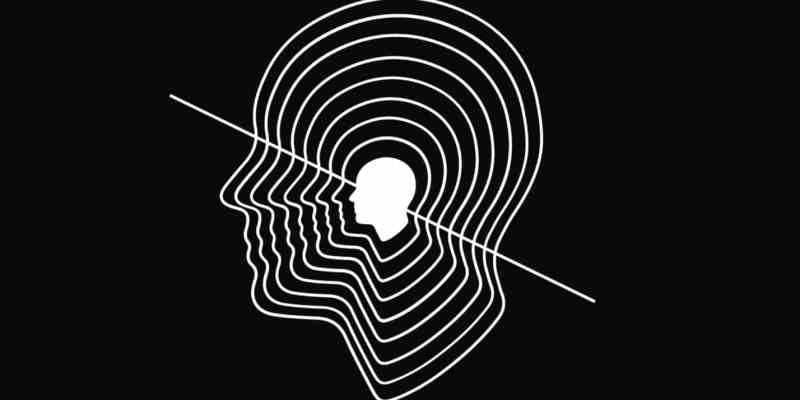Eyes Out revealed itself to the public in August as a gaming collaboration project from Nine Inch Nails guitarist Robin Finck and Spec Ops: The Line director Cory Davis. Bolstered by the promise of a musically driven single-player cosmic horror experience, the announcement made for an intriguing reveal no one saw coming. Eyes Out made an even bigger splash yesterday when the studio announced a deal with Epic Games Publishing, granting it access to funding and support in a variety of ways. We spoke with Davis and Finck to find out more about their newfound partnership with Epic, music experimentation, horror games, and so much more.
The Escapist: Tell me about yourselves and your relationship with games and music. I’d love to hear about how the idea for Eyes Out first came about.
Cory Davis: I’m Cory, and before I ever worked on games, I was super into music. I saw early computers as a way for new types of stories to be told and experienced when I was a kid. So, I started playing guitar, and I started working on whatever kind of mod tools I can get my hands on, making my own projects with my friends, got heavily involved with that as I went into my college years. And from there, I got an opportunity to work on the F.E.A.R. and Condemned games at Monolith, and that was an amazing experience. It really showed me a lot of how the types of games that I was a huge fan of growing up were made.
And from there I moved to Germany with my family, and I was the lead designer and creative director of Spec Ops: The Line. That was my first opportunity as a director of a full project and being able to really set the tone for development and try and push things in the direction that I’m really seeing games going in the future. From there, I moved my family back to LA. I got together with some friends and started a studio called Tangent Games. There, we developed my original concept Here They Lie, which is a really dark, surreal horror experience that came out first for the PSVR and then later for PlayStation.
Towards the end of that project, I started to think (about my next step in game development). And I had this amazing day where Robin actually came into the studio. And being a musician and a game developer, I’m a huge fan of Robin’s work. So, it was an opportunity to show him where we were at before we shipped Here They Lie, get his feedback, but there was a connection made on that day that’s really stuck with me till today.
Robin Finck: I’m Robin, the guitar player in the Nine Inch Nails. I approached the game development community by way of having met Mike Wilson, one of the founders of Devolver Digital, at Burning Man in the 1900s. (laughs) And we kept on and forged a friendship through the years, and some years later he asked if I’d be interested in providing a score to a game that Devolver had in the works. He really kind of ushered me into that close community at Devolver, and I was really inspired by the people I was meeting and the prospect of working on a team uniting around story and that collision of where art and design and sound coalesce. I was really afforded an opportunity to go in through that friendship through Mike.
I had met someone at GameSoundCon in Los Angeles who happened to be working at Sony Santa Monica, where Cory and his team were finishing Here They Lie. As Cory mentioned, I was invited to come experience that before it was shipped, and that’s where Cory and I met, and we really got on in a variety of ways and means. Ultimately, it really fanned that spark into what’s become a roaring fire.
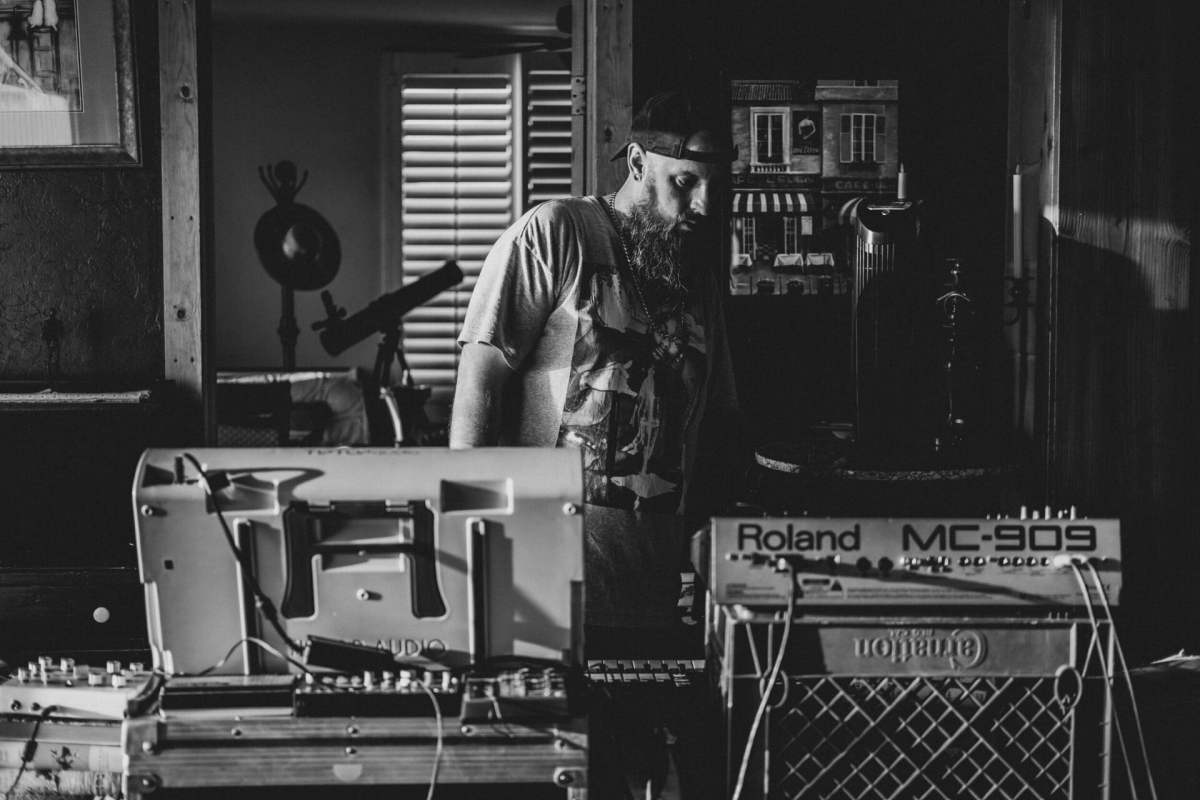
Let’s kind of dig into that a little bit. Can you guys tell me about your working relationship and what it’s been like as collaborators on this first project you have?
Cory Davis: I’ve been looking for a long, long time for ways to bring new perspectives to the game industry and to the projects that I work on in particular. Robin was the first one that I’ve met throughout all my travels in the industry where I felt like we clicked just so naturally. It’s taken my ideas and the things that I thought were the best things I could do, and it’s really propelled me further, working with Robin. We actually share the creative director role on the project. You know Robin’s skills in terms of his music and stuff like that, probably, but it goes way beyond that.
We both collaborate on music, but it’s a starting place that we kind of set the foundation for our whole project upon. We set the tone together, and the narrative and the gameplay bubbles up out of that stew. But it’s been this amazing experience to see Robin and the team really click together with these innovative, new ideas, new places, new types of gameplay that we’re trying to create. I feel like we can go further because our foundation is in that soulful connection that we made together that starts with the music.
Robin Finck: We started working together in a musical capacity, and once that started to really bear fruit, it wasn’t long before we were in front of a whiteboard together, starting to really peer into this universe that we’re continuing to explore. I’m always stepping into a whole new seat in the arena of life. I’m excited, and at times I’m intimidated, and that cocktail really pushes me to dig deep and to bring everything out.
Cory Davis: One other thing I’ll bring up just really quickly is that Robin has this whole side to him that you may not know that comes from a more theatrical background. He was part of a part of Cirque du Soleil. And we’ve taken a lot of the ways that those types of shows and experiences express themselves. Feeding that into our work helps a lot too. So even working with people from outside the game industry like that has brought a lot of infusion of both the unexpected and unique. It’s really pushed us to kind of hone our vision together.
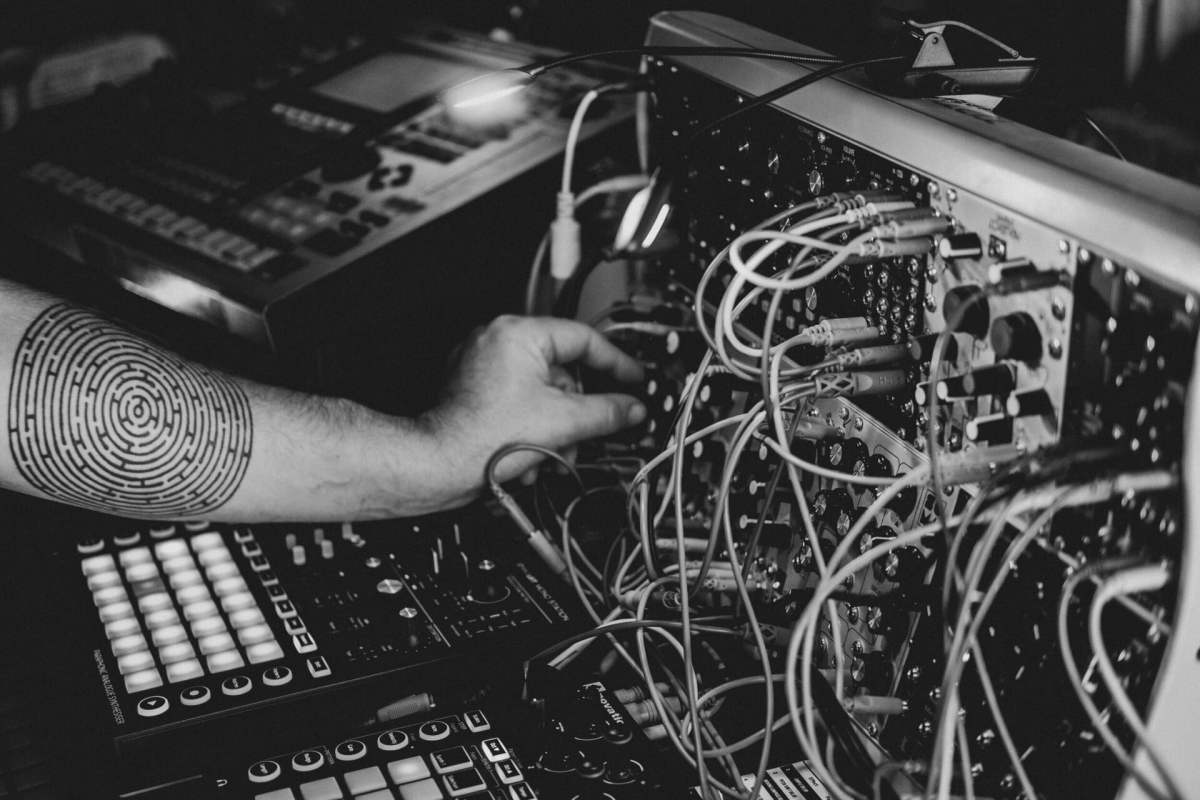
How has the Eyes Out relationship been with Epic Games, and what was the incubation pitching process like?
Cory Davis: It’s been amazing. We needed a partner that would allow us to go in the direction that we really believe in. This isn’t my first time directing a project, and I really feel like it’s time that Robin and I have the opportunity to let our and our team’s voices be heard. As we were putting our stuff together at the beginning, the EpicMegaGrant program was announced. I’ve worked on Unreal games for years and years way back to when I was working on the Unreal Tournament mods as a kid. I really have a lot of respect for the tech side of Unreal. So, this seemed like a little bit of a dream come true.
We put together a pitch to talk to Epic about this new universe that was starting to bubble around us and starting to grow. They really believed in us in a way that touched my heart so much. It was really unexpected. They (have) provided so much support (since we received the MegaGrant in 2019). We get to look behind the curtain on what’s coming up with the engine, and we get to go directly to the source when we have issues. Epic has always been great at support for me, but this is like having them on my team, and that’s just been unbelievable.
Also, creatively here at Eyes Out, we’re building a cosmic horror franchise — and we really want to push in a new direction. We feel like horror really has a lot of room to grow, and games and storytelling do as well. (Epic) as a creative partner (is) pushing us to make it more of what we want it to be, rather than what they feel the trends might be or even what’s happening on their own store, really pushing us to be the creators that we should be… it’s been an amazing experience. And we get to keep the IP.
It sounds like music is going to play an important role at Eyes Out and in its games. Can you talk about how music is going to play a large role in this cosmic horror franchise?
Robin Finck: Music already has a front focus in our process of creation. The experience is immersed in music and the absence of music in-between.
Cory Davis: We have really interesting collaborative sessions where we discuss the narrative, we build up themes together for characters, and we use music kind of as the heartstrings of the entire project. We’re music-forward. We take risks with music in places where people might go silent or might hit you really hard with it because that’s what’s expected. Some of our favorite horror movies and other films, for example, are really meticulous with the details of how they creep up under your skin. It’s the place where we play with your subconscious, and it’s the thing that sometimes you might take to bed with you at night that might creep you out, even more than the monsters that might appear in front of you. It’s just something that makes gameplay so much more powerful and so much more natural.
We have the opportunity to use new technology … that allows us to put all our different sound effects and music on different clocks that we can kind of establish and surprise you with as things in the world manifest that are in rhythm that you maybe don’t even notice at the moment. Then we hit you with the music and surprise you with those things. We’re also experimenting with all the new tech that’s there in terms of generative music, the modular synthesizer that’s in Unreal, being able to allow the world itself and the physical nature of the world — or the non-physical nature it if it’s a surreal location — actually create live sound within the world and add effects to samples that we’ve created and generative audio within the game.
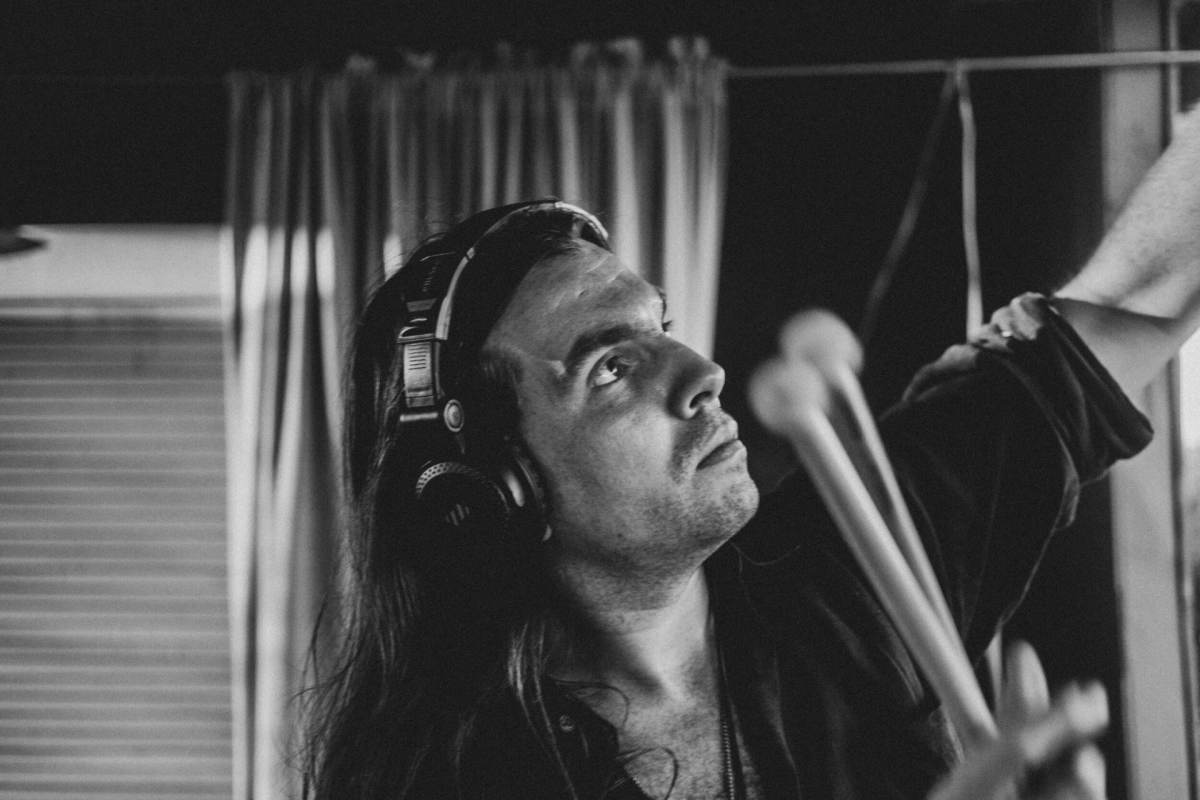
How big exactly is the Eyes Out team? How are you looking to grow?
Robin Finck: We’re at 20 people right now, and we’re seeking positions that you could find on our website.
Cory Davis: Right now, we’re looking to fill a couple of key positions, especially in the environment, art, and technical art area there, if you see on our ArtStation page. But we’re a different kind of team where, instead of blowing up to the size of some of my previous teams, we really reinforced the creators that are around us. We naturally let the team push and pull for the types of resources that are meaningful at the moment. We’ve grown up during COVID. So, the opportunity to work with remote individuals has actually benefited us in a lot of ways. We’re building a really unique team. It’s one that is founded here in LA but now is all over the world. It’s these unique perspectives that add so much depth to what we’re creating.
From what I understand, you guys basically were able to build a piece of your game for Epic. Tell me how that changed your project and what you had originally envisioned.
Cory Davis: I would say the prototype that we built is a lot like the concept that we had gone after, but it physicalized it. It made it something that we could debate and talk about pros and cons that we never could see before we got to that place. I would say it also really helped us look at the breadth of other games that Epic has experience with and how this relates to those. One thing that Epic really brought to the table was, “Let’s talk about who you’re making this game for. Are you making it for yourself? Or are you making it for a certain group of, maybe, special gamers, or other people that fit into a particular description?” So, we honed that in further.
Then in terms of what we’re able to do with the technology, I think with the time that we had, because of their collaboration, we went much, much further. We went further than I’ve ever been able to go with an early prototype, so that now stands with us for the remainder of the project that we can point back to and move into production confidently. I really felt like we clicked creatively, and we had a lot of discussions like, “Oh, is this too long? Is this too short? Should this be cut? Should this be refined? Are we missing this key element?” And they were always just this really positive sounding board.
At first, it is a little nerve-wracking to talk to your funding partner about things that might be uncomfortable and that you are unsure about or that you’re still figuring out as a team. But that’s the relationship with Epic that’s really blown my mind. They’re just there for that type of conversation more than anything.
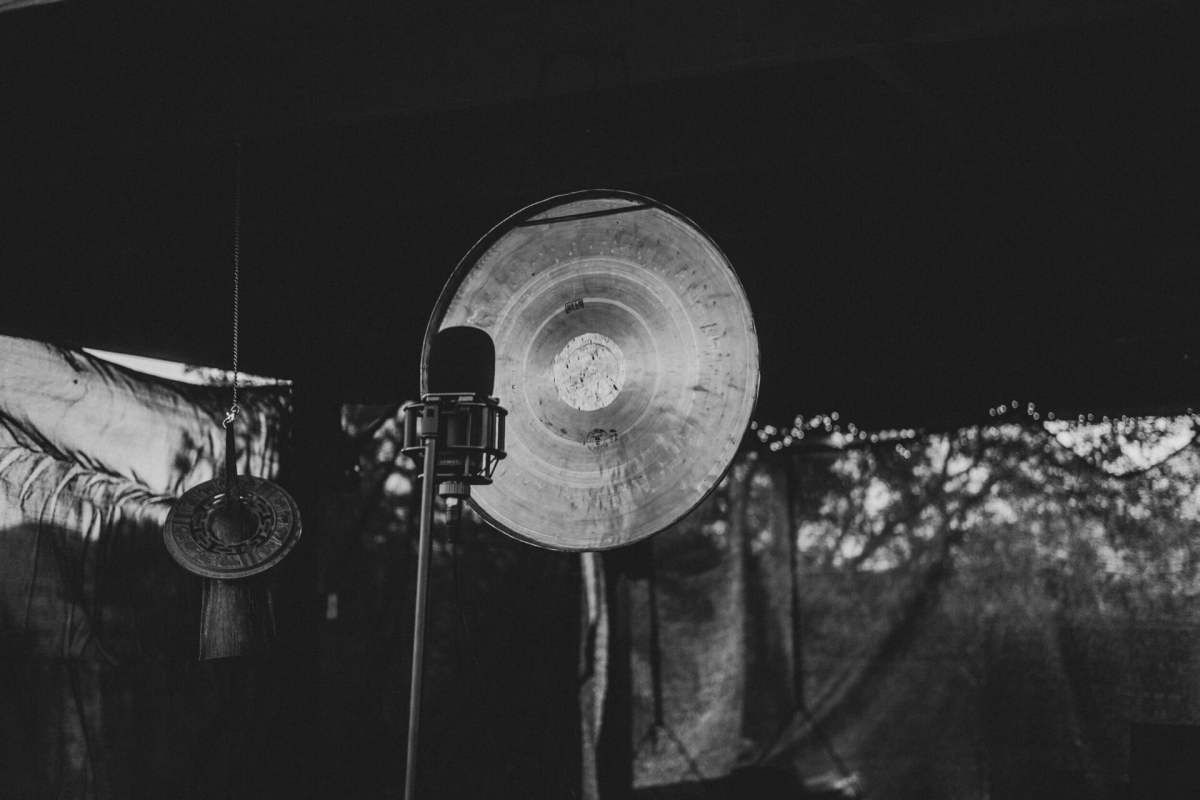
How is this desire to incorporate music pushing Eyes Out artistically? You kind of touched on how you want to really experiment and push the boundaries on what’s possible in video games.
Robin Finck: We’re really using music and audio to propel the narrative forward.
Cory Davis: The thing about it that’s different than establishing with concept art or something like that is that it’s really symbolic. It’s not a script, but it still creates a world for you in your mind and in your subconscious. It’s an invitation for every single person on the team to have their own interpretation that’s not written out for them.
You’ve probably seen some of the images of our music sessions and stuff like that. All of our sessions that we have together start that way. We do a lot of things that are a little bit experimental with the way that we approach it. We go out to the desert to places where we’re off the grid, and we really focus on the connection that we have with both the project and together outside of the project.
It’s really totally possible to be inspired in another direction that we didn’t think of. We constantly use it that way, but we also use that as a model for how we approach mo-cap, for example. We do our mo-cap off the grid on Robin’s acrobat stage. We try to stay analog, in some ways. I think that that’s something that’s different from a lot of other teams.
Robin Finck: And music is a way we can steep in this tone in a physical way, as creators. Physically, we can try it on and swim in it, and there’s immediate feedback, and there’s also a clearing that can be established. Then we can listen as the sound kind of comes through us. And we’re able to now have this articulation that we can then hold and care for and manipulate.
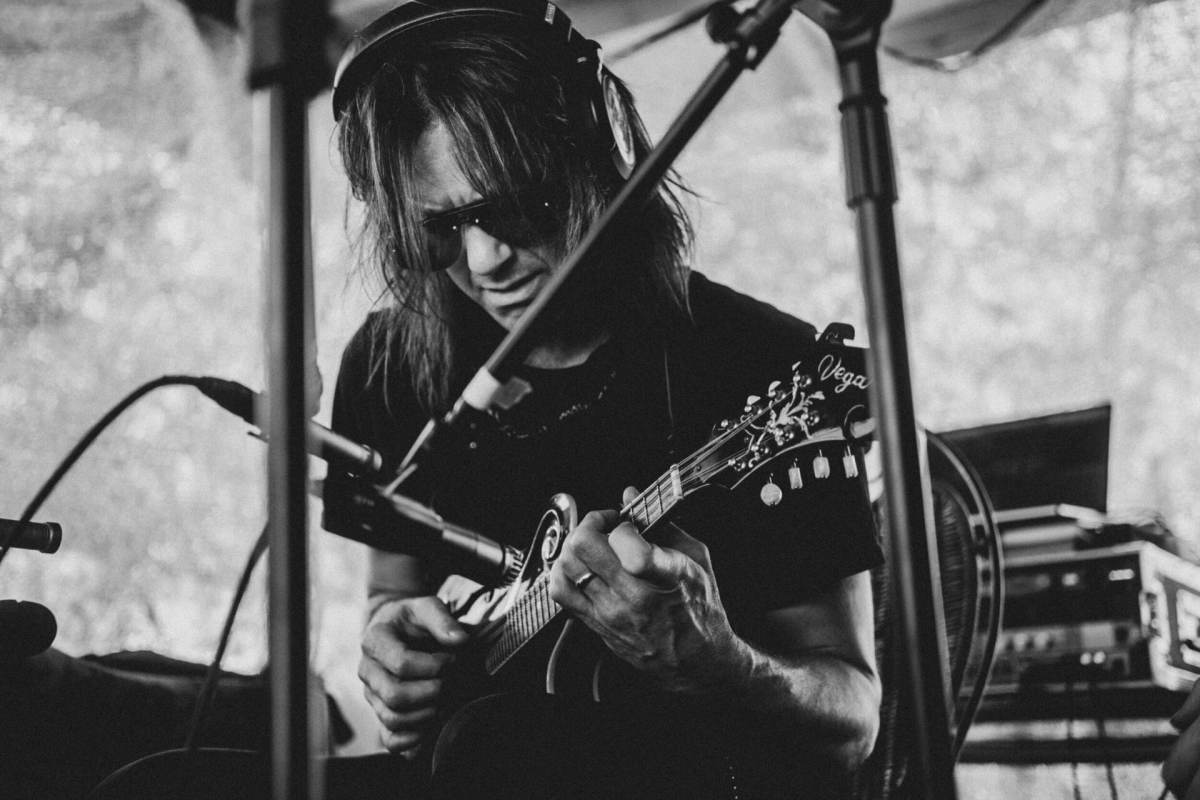
Cory Davis: I think it’s interesting too. As our team has grown, Robin and I are in the music, but we’re also into other stuff. I think everybody on our team, they’re not necessarily music-forward, but they’re unique individuals. They have things on this analog side that keep our strange nature fueled, and that’s meant to come out in our games and in the stories that we tell. It’s really been an awesome experience to let people not just say, “Oh, I’m a rigger. I just do rigging.” Well, that’s awesome that you do rigging, but what is it about you that made you want to do that in the first place?
These philosophical questions I think are important for a team to discuss, especially when you’re working on horror, and you’re working on the mysteries of the universe. Universal questions, like where do we come from? Why are we here? Why do we make the decisions that we make in our lives? Is there something coming up after this? Are there consequences for our decisions? Or are we just exploding into nothingness? Who knows? But these are the types of conversations that we kind of are led into more often as we set the tone with music. It’s really a canvas for us to each dip our brush and approach from a different angle with different lighting and different symbols that are triggered in our souls as we go deeper into the music.
This interview with Eyes Out has been edited for clarity and brevity.
